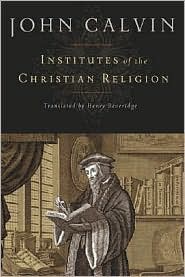*a long post for a single occasion*
I'm all ready to do my final post on Calvin's Institutes of the Christian Religion. I told you one of these days I'd pop up and tell you I had finally finished the whole thing. I finished it yesterday morning and marked it at the end, "The Lord's Day, February 22, 2009." I had really wanted to finish it on a Lord's Day so I had to mark it that way :)
So yesterday someone asked me, "ok, so what did you take away from it?" She's also reading it (just started in January and is hoping to get it read this year so we've been talking about together lately.) Ya know, I think there are a couple things I've taken away from it.
I really do think that it was written to be read all the way through at least once. It builds on itself. Book One speaks of the knowledge of God as Creator. Book Two speaks of of the knowledge of God as Redeemer, first in the Old Testament under the law and now, in the New Testament under the Gospel and Christ Jesus, our Redeemer. Book Three speaks more of us and our duty as believers under that Gospel and that Redeemer that is described in Book Two. It also speaks of the benefits and the blessings that come to those who are in covenant with that Redeemer. And Book Four speaks of the Church: that body of those individuals (spoken of in Boo
 k Three) who are redeemed by the Savior (spoken of in Book Two). So, it really builds: from God, as Creator, to God, as Redeemer and His covenant with a sinful people, to man, as a sinner, and then as a saved sinner, and then that body of saved sinners and their life in the church and in the world.
k Three) who are redeemed by the Savior (spoken of in Book Two). So, it really builds: from God, as Creator, to God, as Redeemer and His covenant with a sinful people, to man, as a sinner, and then as a saved sinner, and then that body of saved sinners and their life in the church and in the world.One of the things that I loved about the book was how thorough it was. Ya know, I know a lot of this stuff. It's not like there were whole sections of the book where I was learning new things. Maybe that's just my environment, I don't know. But it's not like fireworks were goin' off all the time. But it was really helpful in how thorough it was on every point. So when he was talkin' about infant baptism he covered why we believe in infant baptism, positively and negatively (why we don't believe in believer's baptism) and then he covered every argument of the Anabaptists and every argument that anybody else had ever brought up. And it wasn't just on baptism. He was thorough on every point. I mean, sometimes I was reading a section on one particular point and I was thinking, 'is he gonna talk about "this"?' And he did...and covered all the arguments for and against it. So that was really helpful.
I have heard that Calvin is remembered for saying "You can't know yourself unless you know God. But you can't know God unless you know yourself." I saw that to be very true all the way through the Institutes. I mean, from the beginning of Book One. We can't know God as our Creator unless we know that we have been created. But, we can't know that we've been created unless we know that there's a Creator. And that whole thought filters down into the particulars of each Book. I was thinking of it particularly in Book Three, on the Christian Life. Chapter Twenty (one of my favorite sections in the whole book) on prayer: ya know, we can't see our need to pray unless we see how dependent, how sinful, how un-sovereign (yeah, a totally made-up word :) we are. And then at the same time, we can't see our lack of sovereignty and our need for dependence until we see that there is one that is above everything we could ever imagine. One who is so "other" than us. And we see Him more and more in prayer! It's awesome!
Ok, so after I've read the whole thing (which, in case you hadn't gotten the message, I'm so glad I did), but anyway....after I've read the whole thing, I think it'll be really helpful as a reference now. Now I know where all the best quotes are (they're all marked, bulleted, underlined, stared, bracketed, are you getting the point? :) and I know what sections were my favorite. So I think it'll be helpful now as a reference. When I'm really struggling with something, I know where the section on prayer is. I know where the section on self-denial is. Or, if there's ever a question that I'm having a hard time answering, I know where the sections on the sacraments are (oh, and they were rippin' sections, too). I know where the sections on church government are. And they're all marked so I can go right to what I need and what will be most helpful. So in that way, it was really worth reading.
Ok, now, (some of) my thoughts on Calvin are done (for now) and you have to have some quotes to close out the book club (of one member) posts on John Calvin's Institutes of the Christian Religion. By the way, I love it that the last words of the book were so good they were worth underlining, so the last quote I give you is the close of the book.
"...Men are never duly touched and impressed with a conviction of their insignificance, until they have contrasted themselves with the majesty of God." ~Book One, Chapter One, Section Three
"Additional sweetness is given to divine grace, which comes to our aid without the law, and additional loveliness to the mercy which confers it, because they proclaim that God is never weary in doing good, and in loading us with new gifts....divesting [our]selves of of an absurd opinion of [our] own virtue, [we] may perceive how they are wholly dependent on the hand of God; that feeling how naked and destitute [we] are, [we] may take refuge in His mercy, rely upon it, and cover [our]selves entirely with it; renouncing all righteousness and merit, and clinging to mercy alone, as offered in Christ to all who long and look for it in true faith. In the precepts of the law, God is seen as the rewarder only of perfect righteousness (a righteousness of which all are destitute), and, on the other hand, as the stern avenger of wickedness. But in Christ His countenance beams forth full of grace and gentleness toward poor unworthy sinners." ~Book Two, Chapter Seven, Sections Seven and Eight
"...We have obtained what was fit for us, the Lord having so often and so surely engaged to take an interest in all our troubles from the moment they have been deposited in His bossom....For the trials by which the Lord proves and exercises us are severe, no, he often drives us to extremes, and when driven allows us long to stick fast in the mire before He gives us any taste of His sweetness....What could they here do but become dispirited and rush on despair, were they not when afflicted, desolate, and half dead, comforted with the thought that they are regarded by God, and that there will be an end to their present evils. But however secure their hopes may stand, they in the meantime cease no tot pray, since prayer unaccompanied by perseverance leads to no result." ~Book Three, Chapter Twenty, Section Fifty-Two
"...We are redeemed by Christ at the great price which our redemption cost Him, in order that we might not yield a slavish obedience to the depraved wishes of men, far less do homage to...impiety." ~Book Four, Chapter Twenty, Section Thirty-Two





